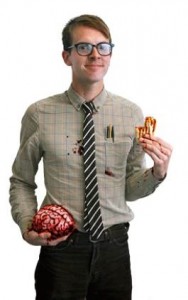 Doctor Austin of the renowned Zombie Institute for Theoretical Studies, based in the University of Glasgow, has come to educate the Edinburgh Fringe about the inevitable Zombie Apocalypse. Get the facts you’ll need to survive from his two “tutorials”…
Doctor Austin of the renowned Zombie Institute for Theoretical Studies, based in the University of Glasgow, has come to educate the Edinburgh Fringe about the inevitable Zombie Apocalypse. Get the facts you’ll need to survive from his two “tutorials”…
Zombie Science: Brain of the Dead is a spoof lecture all about the Zombie brain; we have interactive demonstrations, combat demonstrations, and look at how the disease could affect certain areas of the brain to see the symptoms that we’re all familiar with. So, for example, the cerebellum is key to us moving around; drinking a lot of alcohol suppresses this area of the brain which is why, on a Friday and Saturday night, people do wander around a lot like Zombies!
Zombie Science: Worst Case Scenario is a tutorial that has a fictitious Zombie disease outbreak, and the audience are asked to vote and make decisions on how to deal with it. That can change the outcome of the show—so no two shows are ever quite the same.
What is it about zombies that’s helped them become the big “monster”?
In the last couple of years, Zombies have become their own sub-genre of horror and are worth millions of dollars in the US. What I personally think is that life is so complicated these days that people are looking for an Apocalypse scenario where all you have to do is survive: you can smash through windows and take whatever you like, you can kill people you don’t like. I think people have this idea that it would be a fun and simple life, but the reality of bashing your loved ones’ heads in hasn’t dawned on many people.
Is part of the attraction of Zombies for an increasingly secular world is that, unlike Vampires and Werewolves, they don’t come with any religious or spiritual ‘baggage’?
The interesting thing about Zombies is that they do comes from religion. The only real Zombies that have ever existed in the world have been in Haiti where a Voodoo sorcerer would use a potion—primarily made up of tetrodotoxin, which comes from Puffer Fish—to make people appear they were dead; they were buried and then the sorcerer’d dig them back up, lessen the dose and use the people as zombie slaves. Of course many people, such as George Romero, have used Zombies as a way of talking about consumerism; in fact, there’s a great meme on the internet where you see a bunch of people walking down the street all staring at their phones, somehow suggesting that the Zombie Apocalypse is already here.
How real is the science in these “tutorials”?
Our shows basically have three elements: Zombies, Science and a bit of Comedy. But they’re all based on genuine science. We are partly supported by The Wellcome Trust—they’re a big biological science charity—and, of course, we’re based in the University of Glasgow at the School of Medical, Veterinary and Life Sciences, so we have all their top experts, along with myself, contributing and making sure the science is real. We are the Zombie Institute for Theoretical Studies. There are no Zombies at the moment, so no one has to be alarmed, but we’re interested in what they might be like if they were real.
How did you get involved with this?
I got involved in this about four years ago when we got our first grant; I used to be a scientist, now I get involved in public engagement, and my main goal is to trying to communicate the science of Zombiology to people. Hopefully it will get them interested in not just Zombiology but related biological sciences. Bringing these shows to the Fringe is a way to get people who don’t normally get involved in science, but maybe like Zombies, to come along and maybe be a bit inspired.
http://www.broadwaybaby.com/shows/zombie-science-b…
http://www.broadwaybaby.com/shows/zombie-science-w…
http://www.zombiescience.co.uk/
Twitter: @ZombieScience1Z
First published by BroadwayBaby.com, 1 August 2014.